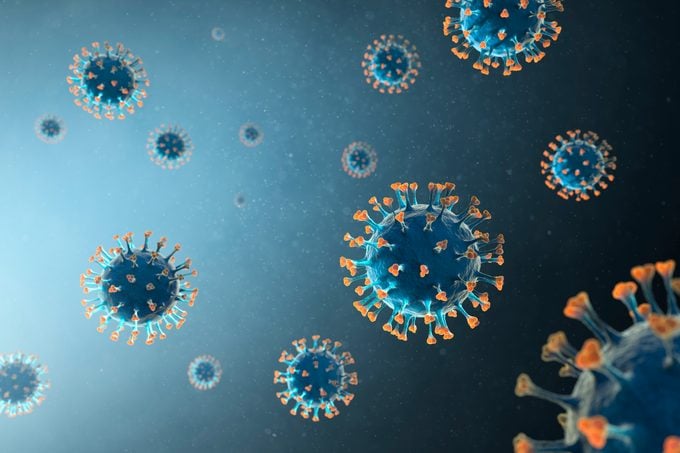Is Dry Mouth a Symptom of Covid?
Updated: Mar. 30, 2022
Out of nowhere, your mouth is bone dry. What gives? Could it be Covid-19? Maybe. Experts discuss the link between dry mouth and Covid-19.
Is dry mouth a symptom of Covid?
Yes, you can add dry mouth to the growing list of potential Covid-19 symptoms.
As many as 40 percent of people with Covid-19 may experience symptoms of dry mouth or xerostomia (as it’s known medically) during or after the illness, according to a study in the Journal of Dental Research. Some people may develop dry mouth even before any other Covid-19 symptoms.
“This is even higher than the number of people who report a loss of taste with Covid-19,” says Kevin M. Byrd, DDS, PhD, Anthony R. Volpe Research Scholar & Manager of Oral & Craniofacial Research, Lab of Oral & Craniofacial Innovation (LOCI); American Dental Association Science & Research Institute.
Here’s everything you need to know about this symptom, including its connection to Covid and other dry mouth causes.
What is dry mouth?
Your salivary glands normally produce saliva, which releases into the mouth via ducts.
Dry mouth occurs when saliva production slows down or stops, and it’s more than just a nuisance. It can cause problems with swallowing, speaking, and eating.
In addition, saliva protects your mouth and teeth. When it is in short supply, you can develop cavities and/or painful mouth infections, including yeast infection or thrush.
The saliva of people with Covid-19 can contain high levels of the virus. This is one of the reasons that Covid-19 saliva tests, including home tests, can help detect the virus, Dr. Byrd says.

Dry mouth and Covid-19
And now research in the journal Nature Medicine provides clues as to how Covid-19 affects the mouth and saliva.
A team of researchers from Wellcome Sanger Institute in Cambridge, U.K. and other organizations in the U.S. and U.K., identified the angiotensin-converting enzyme 2 receptor, or ACE2 receptor, in cells of the salivary glands and tissues lining the mouth. This is the protein that SARS-CoV-2, the virus that causes Covid-19, locks into for entry into the body.
The researchers also found that the virus can multiply in the cells of your salivary glands. The researchers exposed saliva from eight people with asymptomatic Covid-19 to healthy cells grown in a dish. This experiment led to the infection of the healthy cells.
The researchers also gathered saliva from a separate group of 35 volunteers with mild or asymptomatic Covid-19. Those symptomatic people with higher levels of the virus in their saliva were more likely to report a loss of taste and smell than those with lower levels in their saliva.
“Saliva dumps into the mouth, which is that largest gateway into the body, and is a place where you can not only can be exposed to Covid-19, but can expose others,” says Blake M. Warner, DDS, PhD, an assistant clinical investigator and chief of the salivary disorders unit at the National Institute of Dental and Craniofacial Research of the National Institutes of Health in Bethesda, Maryland. Dr. Warner was a senior investigator on the research published in Nature Medicine, along with Dr. Byrd.
This helps explain some of the oral symptoms of Covid-19, such as loss of taste, blistering, and dry mouth.
“When infected saliva is swallowed or tiny particles of it are inhaled, we think it can potentially transmit SARS-CoV-2 further into our throats, our lungs, or even our guts,” adds Dr. Byrd.
This is yet another piece of evidence that shows that wearing masks in public spaces can help stave off the spread of Covid-19, he says.
“It not just respiratory droplets that enter the lung upper airway through the nose,” Dr. Warner says. “Particles may be generated in the mouth, and talking with each other may spread Covid-19.”
Dr. Byrd agrees: “The oral cavity is not an offsite target. It’s a primary site and is very frequently infected with Covid-19.”
Another small study in Future Virology found that dry mouth may be among the first symptoms of Covid-19, opening up a window to prevent transmission.
Fully 60 percent of people reported dry mouth three to four days before any other Covid-19 symptoms. Others said their mouth was dry simultaneously or for one to two days after the onset of other Covid-19 symptoms. Dry mouth tended to improve with treatment for Covid-19.
(These are the worst symptoms that linger after Covid.)
Other dry mouth causes
Of course, there are lots of other potential causes of dry mouth other than Covid-19, including medication side effects, alcohol, caffeine, or tobacco use, and/or certain underlying medical conditions.
Treating these dry mouth causes starts with lifestyle choices, including drinking more water, especially during meals. Chewing sugarless gum with xylitol can add moisture back and may even stave off cavities, Dr. Warner says.
Regular dental care is also important to help avoid cavities and mouth infections, Dr. Warner says. (These natural remedies for dry mouth will make you feel so much better, too.)
Note that new onset dry mouth—even in the absence of other symptoms—without any known cause is enough to consider getting tested for Covid-19, Dr. Warner says.
There may one day be a role for germ-killing mouthwashes to combat SARS-Cov-2 in the mouth, but it is too early to make any blanket recommendations, Dr. Warner says.
The best way to prevent Covid-19 is to get vaccinated as soon as you are able, wear masks in public places and spaces, and stay home when you are sick.

















